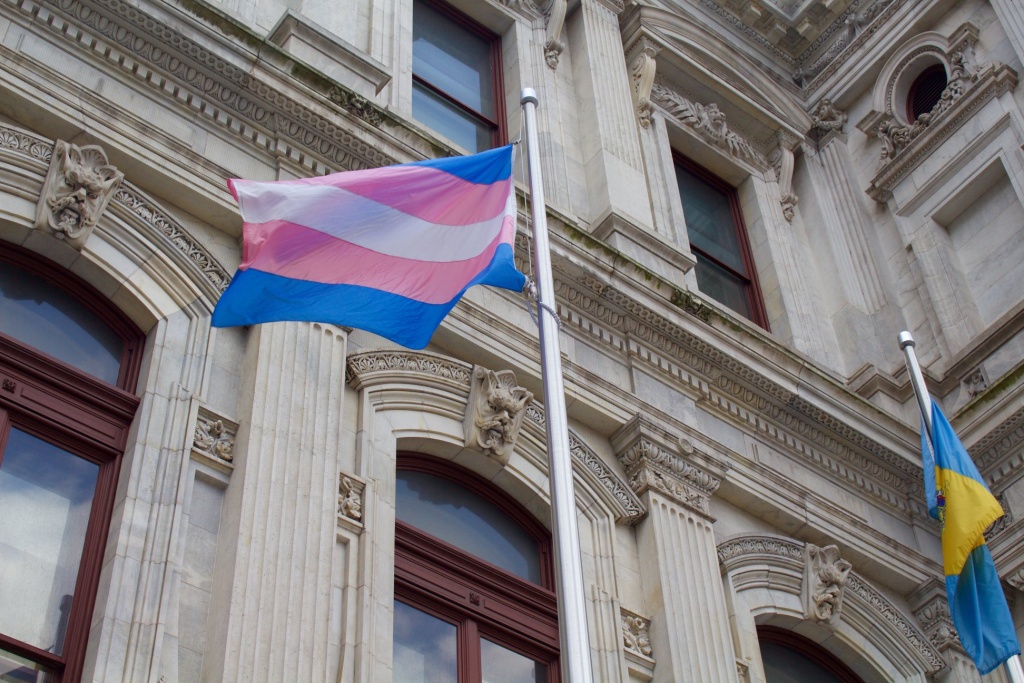Before Aidan DeStefano came out as trans, he felt “trapped.” As a child, he kept his hair short and wore boys’ clothes.
“How could I possibly explain to somebody that I had a male brain but female body?” said DeStefano, who started testosterone at age 15 before later undergoing gender-affirming surgery.
Now 20, DeStefano has spent the last several years waking “up with the biggest smile on my face, knowing that … nobody can stop me.” He recently supported the U.S. Supreme Court’s declination to hear a case challenging Boyertown School District’s policy allowing trans students to use bathrooms and locker rooms corresponding to their authentic genders.
DeStefano joined Mayor Jim Kenney, Office of LGBT Affairs staff and LGBTQ community members and leaders for the fifth-annual trans flag raising at City Hall on Thursday afternoon.
Hoisting the blue, pink and white stripes in the air kicked off the Philadelphia Trans Wellness Conference, the largest free trans conference in the world, running July 25-27 at the Pennsylvania Convention Center. Philadelphia was the first U.S. city to raise a trans flag at a municipal building, said Office of LGBT Affairs Executive Director Amber Hikes, and is still the largest locale to do so.
“In Philadelphia, we know that it is transgender, nonbinary and gender nonconforming communities who throughout history have long led the battle for the fundamental rights of all of us,” Hikes said to the crowd of about 100 people. “We know that it’s trans activists and trailblazers since the beginning of time who have fought for our right to be seen, recognized and affirmed in our true, most authentic selves.”
Many speakers noted the importance of celebrating the conference’s “trans joy” theme amid a national inclination toward hate and violence directed at the trans community during speeches at Thursday’s event.
Tatyana Woodard, trans woman and community engagement coordinator at Mazzoni Center, said it was a “difficult year” for the community between President Trump’s administration and the high murder rate of trans women of color.
In May, the Trump administration proposed legislation — popularly dubbed the “Denial of Care Rule” — that would allow healthcare workers to refuse to perform gender-affirming surgeries because of personal religious beliefs. The law’s enactment was pushed back after local and national LGBTQ organizations challenged it in court.
The Human Rights Campaign has identified at least 12 trans people — all Black trans women — who have been murdered across the country in 2019, including Philadelphia’s Tameka “Michelle” Washington, who was killed in the city’s Franklinville neighborhood May 19.
“It is our responsibility now more than ever to make sure we protect our trans and nonbinary community members’ right to exist, be seen and be proud,” Kenney said. “We must work harder than ever to ensure that trans, nonbinary and gender nonconforming folks are cared for legally, physically, emotionally and mentally.”
Jay Alston, Mazzoni Center’s events coordinator for technology and data and new board member of the Mayor’s Commission on LGBT Affairs, asked how the trans community can push for wellness amid “a violent and deeply troubled culture.”
“We fight our battles as individuals, in doctors’ offices, courtrooms, workplaces and classrooms around the world, but the trans community has an even greater fight toward true holistic wellness,” he said.
Both locals and out-of-towners gathered for Thursday’s event. Around 10,000 people from across the world are anticipated to attend the Philadelphia Trans Wellness Conference.
Jules Zuckerberg, who came from Brooklyn, New York for the conference, said the flag raising was a “wonderful and symbolic moment.”
“This was trans visibility,” they said. “This was radical activism, the whole city uniting.”
Zuckerberg’s friend, Dash Kwiatkowski, also of New York, said “the legitimacy of a city raising the flag means a lot” because both Democratic and Republican presidential administrations have taken “fairly anti-trans” stances in recent years.
“It’s little steps [like this] that let people from these groups know that they are welcome and letting people who oppose these groups know that they are unwelcome,” he said.
Others in Thursday’s crowd would prefer to see Philadelphia officials support the trans community through policies and resources.
North Philadelphia trans person Melody, who preferred to be identified by their first name, said they would “love the city to be more proactive” by allowing people to use chosen names on city municipal IDs, which allow self-selection of gender.
Southwest Philadelphia resident and trans man Ayydn Edwards said that while visibility is important, “there’s so much more that people can do to show that they’re accepting trans people and nonbinary people into the city,” like expanding medical care.
“There are so many things that they can change and that they can work out to help more trans people feel accepted in hospitals and [by] primary doctors,” he added.
